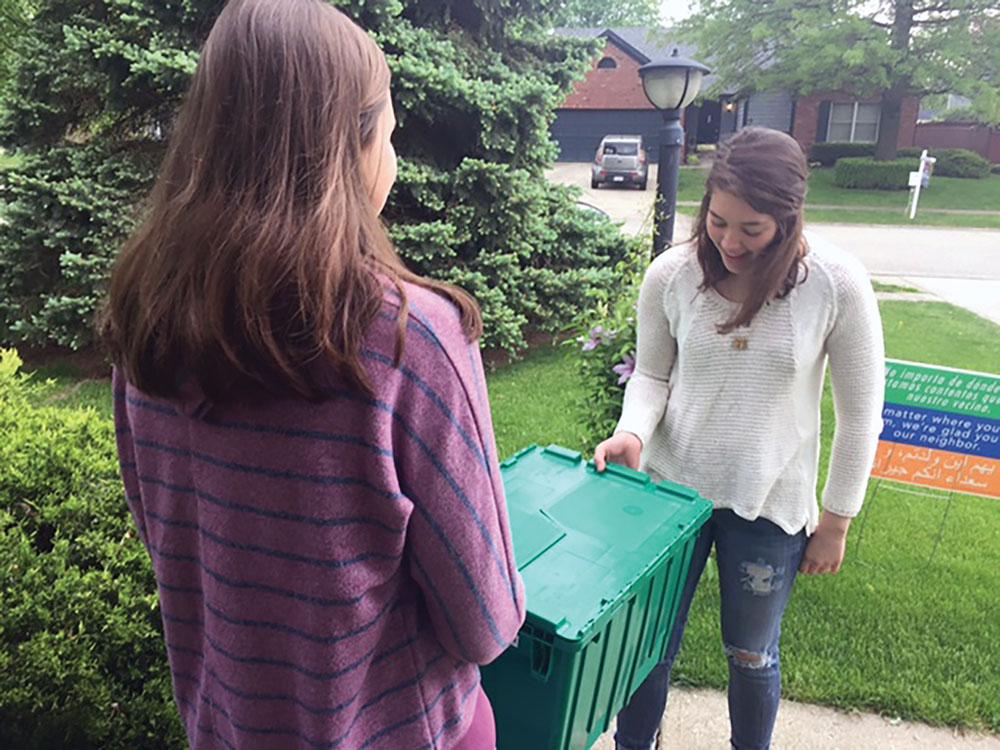Your donation will support the student journalists of Carmel High School - IN. Your contribution will allow us to purchase equipment and cover our annual website hosting costs.
Senior Kyra Krall (right) and her sister, sophomore Olivia Krall (left), carry a carton from Green Bean Delivery. Green Bean Delivery is an organic food delivery servcie that provides fresh fruits and vegetables. Krall said her family receives organic food from this delivery service each Wednesday.
Got Organic? Despite the rise in food-buying consciousness in the 21st century, some obstacles make that lifestyle difficult
May 18, 2017
According to senior Kyra Krall, her family often orders plentiful organic produce, ranging from Indiana pasture-raised eggs to organic lacinato kale from Green Bean Delivery, a company that makes local, sustainably-grown groceries easily accessible to Midwestern families. Supporting small local farms from the comfort of their own home is one way the Kralls are playing their role in the growing ethical wisdom behind the food industry. Despite this habit of giving back to the Earth, Krall said her family does not always stay within the lines of that strict diet plan.
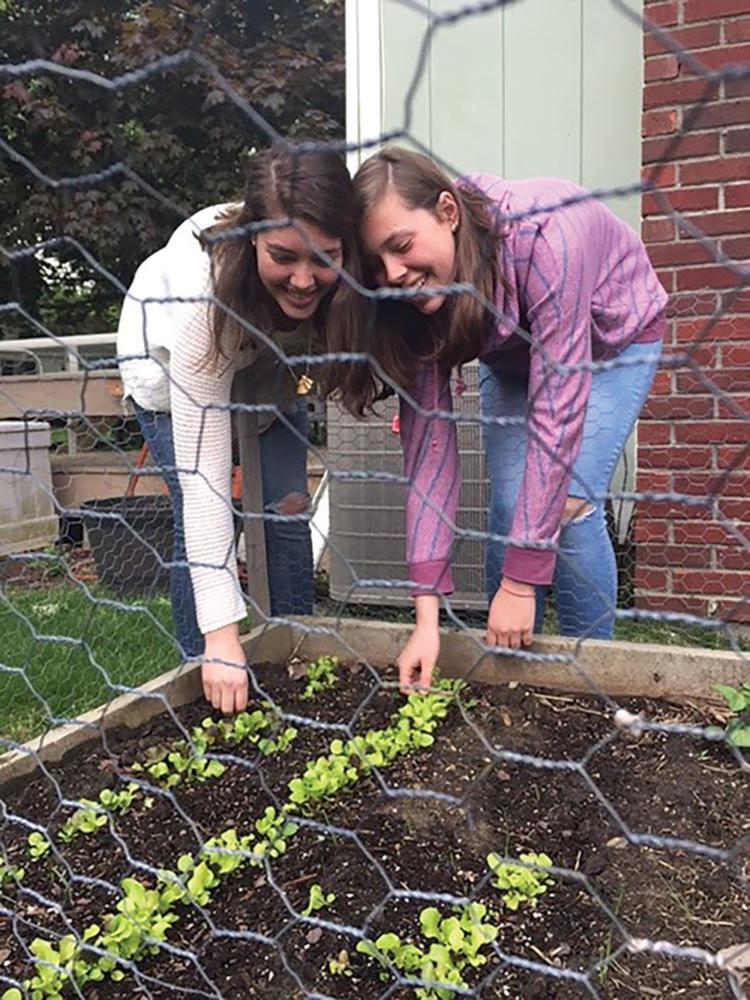
The Krall sisters tend to the vegetable garden in their backyard. According to Kyra, they grow potatoes and cabbage among other vegetables in their garden in order to try to maintain a healthy and organic lifestyle.
A Pew Research study published last December found retail sales of organic food have more than doubled from 1994 to 2014 with an annual 10 percent increase. According to the study, this increase in sales is likely caused by an increased awareness of the health and environmental benefits associated with organic food. However, despite potential benefits, some CHS students said they struggle to maintain an organic lifestyle due to monetary and lifestyle factors.
“(My family) likes to eat a lot of organic and local products just because we think they’re better for people, and they make us feel better,” Krall said. “(But), it’s not so rigid that there (are) rules about it; it’s just about trying to do the best that we can. We don’t have a lot of processed foods—mainly because of the health reasons—but it’s better to support local farmers and local companies than it is to support big companies with a lot of money.”
Krall said between organic foods and foods that are treated with pesticides and herbicides, the price difference is one of the main reasons her family’s fridge does not house the same ratio of meat to vegetables than the non-organic alternative would.
Krall said,“We only try to eat meat two or three times a week and not every meal so we can try to spend more on produce. It’s hard because it’s expensive, and it’s hard to make sure that nothing that you eat has that kind of stuff in it.”
Baking teacher Sonya Brown said she has increased the number of wholesome, healthy foods in her diet since the summer to improve her health without marginalizing the ingredients to organic or ethically sourced. She said although there are some foods best eaten organic, the entirety of one’s grocery list does not need to be, and choosing wisely would not affect the bill as much.
“I think it’s really important that berries (are purchased organic) because they are highly pesticide-(treated). Also, grapes, lettuce and peppers (should be too); those types of things are all going to be best organic mostly because of the pesticide use. We are eating that whole as it is; we are not taking anything away or peeling it. But some of the other things with hard rinds, like bananas or avocados, are not necessary to buy organic,” Brown said.
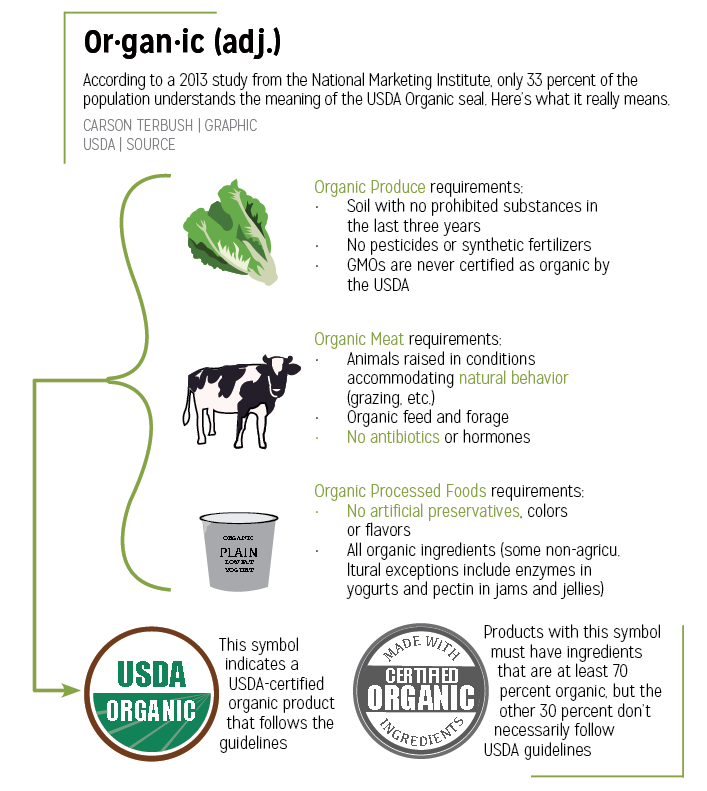 Agreeing with Krall, Brown said the absence of processed foods lends itself enormously to one’s health and balances out the cost associated with the change to an organic diet. However, Krall said despite her strong beliefs in ethical and organic foods, she also gravitates toward snack foods whenever they are available.
Agreeing with Krall, Brown said the absence of processed foods lends itself enormously to one’s health and balances out the cost associated with the change to an organic diet. However, Krall said despite her strong beliefs in ethical and organic foods, she also gravitates toward snack foods whenever they are available.
Senior Miranda Frausto, another active ethical consumer and copresident of Environmental Action Club, concurred with Krall that following hardline moral behavior is difficult.
“It’s not something that we do 100 percent of the time,” Frausto said, “but we have our cheats: junk food. Some habits are hard to break; as much as we want to do as much as we can, we have a few things that aren’t following those guidelines like Lay’s Potato Chips (and) Oreos. I would say that since I’ve been learning about the processes going into food production, I’ve winded down. I don’t buy (those) things as much. Hopefully, one day, it won’t be all.”
Frausto said she is a vegan as well, which is why she opts for snacks like Oreos in a non-vegan setting.
According to Woodland Park Zoo’s “Orangutan-Friendly Sustainable Palm Oil Treat List,” Oreos and Lay’s Potato Chips are labeled as sustainable palm oil acquisitors. However, somewhat contradictory to the zoo’s claims, Ethicalconsumer.org, a resource for tracking food sourcing, gave Oreos a middle rating in March 2017, explaining “95 percent of the company’s palm oil, palm kernel oil and derivatives were certified under several different methods, mainly ‘book and claim.’” This means Mondelēz International, the owner of Oreos, did not release a comprehensive report on its source for these ingredients and did not give direct information on positive impacts or changes made within the company’s palm-oil policy.
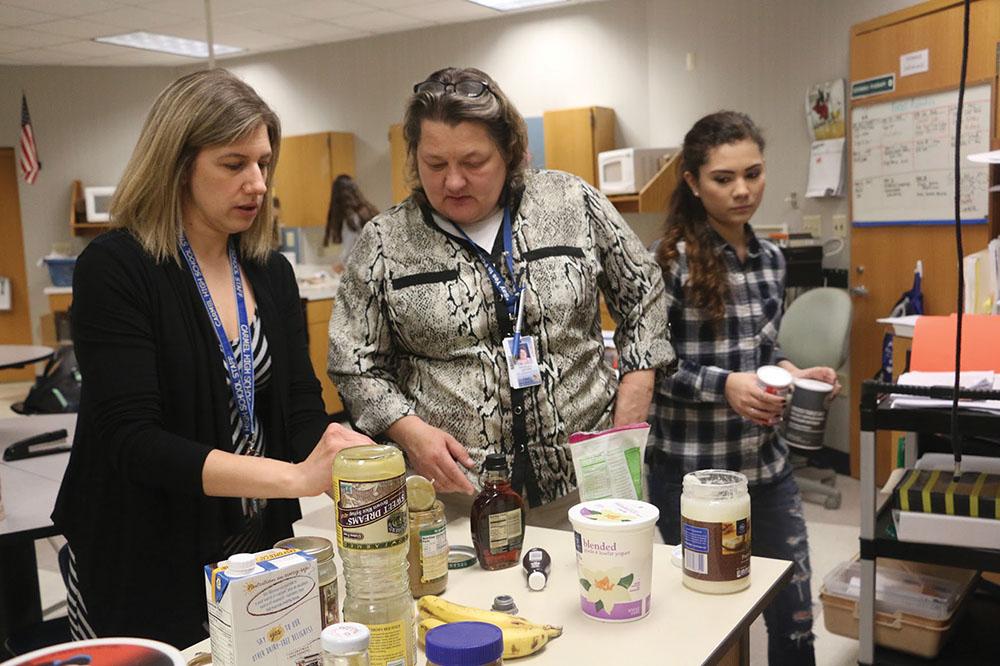
Sonya Brown, nutrition and wellness teacher, organizes ingredients in preparation for her next class along with Food Science teacher Brenda Lester. Brown said she recently made lifestyle changes in an effort to improve her eating habits.
This ties into another concern Krall and Frausto said they have that guided them toward their moral stance: environmental protection. The unsustainable and unethical sourcing of cash crops like palm oil causes detrimental habitat destruction, seen in most in rainforests, which leads to the growing decline of orangutan populations and many more species, according to the World Wildlife Fund.
Sophomore Bridget Chemberlin said she is an advocate for animal rights and organic food-growing practices, which is influenced by her environmental consciousness and reflected by her choice of a vegetarian lifestyle. She said her family tries their hardest in supporting the environment through ethical food purchases, but cost prevents them from going fully organic.
Chemberlin said, “We frequent farmer’s markets in the summertime and stuff like that, but it can also be hard because organic milk is $4.50 per gallon and non-organic milk is $2, so sometimes my parents are concerned about the cost of trying to lead that lifestyle.”
According to Chemberlin, her family is adamant on tradition in food as well, which prevents them from always buying organic.
“There’s foods that my parents grew up eating, like packaged foods, that they’re used to eating (and) that everybody eats, and they’re not naturally sourced but everyone still eats them. So, they’re just part of what I guess (is) a regular diet in America,” Chemberlin said.
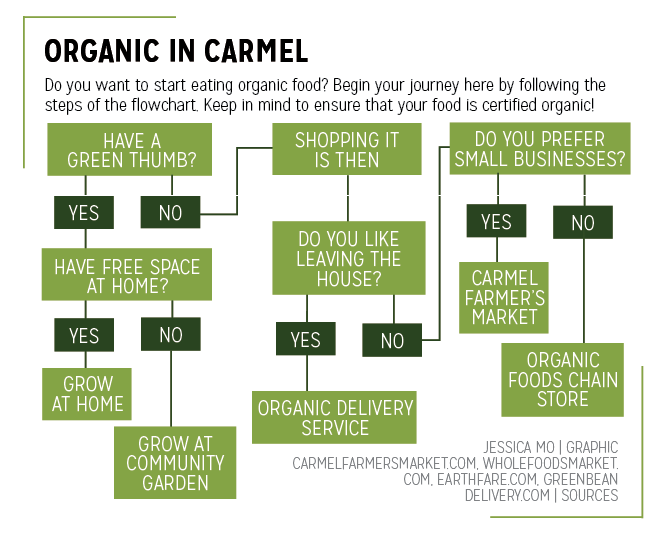 If she were in charge of the money, Chemberlin said she would buy only organic and free-range, cruelty-free foods.
If she were in charge of the money, Chemberlin said she would buy only organic and free-range, cruelty-free foods.
But through all the difficulties of keeping track of one’s food consumer habits, Frausto said it’s important to keep the big picture in mind.
“My motto for being more an environmental-process buyer is people may think that it may not be significant, (but) since it is on the rise, it’s continued to grow and force companies to take a better look if their clientele is becoming more conscious of their (food treatment) process,” Frausto said.
The prominence of supermarkets and wholesalers like Kroger or Costco can sometimes diminish the attraction of organic and ethical alternatives like Trader Joe’s and Whole Foods to the average populace. Overall, this conflict of interest plays into ethics of the corporation-consumer-Earth relationship impacting the health and future of the human race. But when nitpicking individual habits, from choosing which grocery store to patron to which food type to abstain, obstacles involuntarily weasel their way into decision-making consciousness.
Krall said, “We’re just trying to find options that are organic, but in the end, it’s very hard to maintain that lifestyle all the time.”


